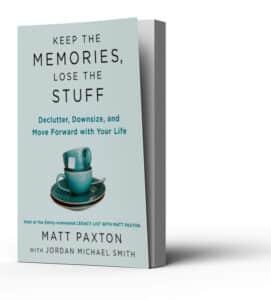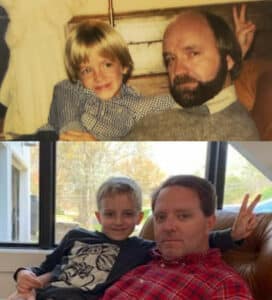Matt Paxton, the guru of getting rid of excess, is also expert at packing an awful lot of information and anecdotes into a time-limited telephone interview.
Must be the 22 years he’s spent helping people pack up all the odds and ends they’ve accumulated so they can move on to life’s next chapter.
It comes fairly naturally to Richmond, Virginia native Paxton. He’s a downsizing and decluttering expert who runs the Clutter Cleaner business from his home in Atlanta. He’s also the host of the Emmy-nominated PBS show “Legacy List with Matt Paxton’’ and is featured on A&E’s “Hoarders’’ program.
 Paxton’s written a book about his experiences that’s also a self-help guide to getting rid of what you don’t need, “Keep the Memories, Lose the Stuff.’’
Paxton’s written a book about his experiences that’s also a self-help guide to getting rid of what you don’t need, “Keep the Memories, Lose the Stuff.’’
His book is an artful combination of wrenching personal stories — the woman who discovered $600 in savings bonds her estranged mother had tucked away for her — to no-nonsense tips such as, “For bathroom showers and tiles, there is no better scrubber than the Dremel Versa cleaning tool.’’
“The resource section was the hardest part for me to write, because let’s face it: I still do this professionally, I still clean houses and so I thought, do I really want to give people a road map on how to do it themselves!
“Then I had a “Come to Jesus’ moment, where I realized if they can’t do it themselves and a lot of people don’t want to, they’ll come to me. So, I wanted to make it a good book, and giving them the full tools to do that makes it a good book.’’
The math of moving
Rich and detailed as the book is, an advisor might find a client still needs a nudge to get going. What does Paxton suggest?
“First, we have them ask why are they moving. Focus on the why. Then let the numbers back it up. Often the client thinks they can’t afford to move, but we usually find out, they can’t afford to wait to move. The cash value in the house is often more than enough to pay for the next phase of housing,’’ Paxton says.
“I encourage them to have the client just look at the numbers with them and show what waiting three months, six months, one, two and five years to move would do to the home value of their home. Sometimes now is the financial best time to move.
“Then I have them focus on what is holding them back. It’s often that they think the items they have in the home are worth more than they actually are. Let them know that most items sell for about 10% of what you think they are worth. I repeat that, 10%. After you take what you want out of the house then the average value of all home contents left is about $7800.
“The third number I get them to focus on is how much their time is worth. I tell everyone to put a $25 an hour value on your home. Do you really want to spend 100 hours or $2,500 of your time trying to get another $750 out of your stuff that isn’t worth anything?
“The last thing I’ll say is, focus on hiring a professional to help you empty the house and you’ll be able to get out of the house faster and maximize the value of the real estate which is the only item of substantial financial value,” Paxton says.
Getting personal

Paxton was disappointed with the book in its initial version, so he rewrote it to combine the practical with the visceral, including deeply personal, even tear-jerking anecdotes.
“When we found the $600 in savings bonds, the woman’s daughter told me, ‘I haven’t talked to my mother in 10 years; I didn’t think she cared about me.’ Her mother had bought her a $50 bond with every paycheck, so she had been thinking of her daughter. Knowing that changed the daughter’s life.’’
Paxton knew from what he wrote. He’d been through an emotional roller coaster ride 20 years earlier when his father died in Richmond. Father and son were so close, Paxton couldn’t part with his father’s voluminous belongings. Until, he met his now-wife, Zoe Kim, and marriage meant he had to move to her home in Atlanta.
Forced to declutter, Paxton formulated what became Clutter Cleaner’s mantra: “Stories would be a way for us all to keep my father alive after he died. That lesson on the eternal life that storytelling offers, was the first spark in what eventually became my career,’’ he writes.
“Keep the Memories, Lose the Stuff’’ had sold about 30,000 copies at the time Paxton spoke. He says his book elicits thank-yous from readers because it’s personal.
“People say “Oh, I love this chapter because it reminds me of my grandma, or my grandpa,’ and then they tell me their stories!’’
A family affair
Paxton, 48, says his book is aimed at readers aged 45 to 75 because that age group is most often responsible for dealing with the remnants of their parents or siblings’ estates. And most of those responsible parties are women.
“Still, the oldest daughter is the one who gets tasked with all this. What has changed in the last 30 years is that the oldest girl who was then a stay-at-home mom is now a doctor, a lawyer, a CEO or a teacher but they still are tasked with having to do all this! They have the resources but they need the help.’’
But guilt often begets inertia about cleaning out and moving on among that key group of aged 45-75 clients; they often struggle with decluttering their parents’ homes and the remnants of their estates.
Paxton says such thinking is non-productive.
“Trust me, most people would want you to do it as quickly as possible and maximize the value of the home. Don’t spend months emptying it with guilt. Hire a professional to help you get it done in three to four days. You’ll spend most likely $1,500 to $2,500 a day for professionals to get it done months faster than you can. It helps you get back to your life and family, which is what your loved ones would actually want.”
“When dealing with an estate, I always encourage getting a professional to help you, it’s a massive endeavor. If your roof was leaking, you wouldn’t try to fix it yourself; same with estate cleanout. And by the way, guilt is just a distraction keeping you from getting the job done,’’ he says.
A $40,000 dilemma
Paxton helped one client resolve guilt over what to do with valuables left behind by a sibling. The client’s children wanted the money from selling the valuables. The client was torn.
Master carpenters and brothers Ben and Darren ran a successful business in Maryland. When Darren died, Ben discovered his brother left $40,000 worth of prime tools. Paxton decluttered Darren’s house and belongings for Ben, and guided Ben into making a decision that accounts for the most tear-jerking moment of the book: Rather than sell the tools, Ben gives the tools to a financially strapped apprentice named Kevin, who idolized Darren’s ability and work ethic. As Ben presents Kevin the tools, Paxton looks on as the men openly weep.
Just to add icing to the cake, Darren’s valuable and expertly curated collection of books and periodicals is donated to the local library where Darren was a cherished and much-respected member.
Sitting on a fortune
Before the reader runs out of tissues, Paxton drops a wisecrack or a jaw-dropping anecdote to keep things light.
Like the clients, big names in the circus business (Paxton declined to name them) whose clutter included certain parts of lions that had undergone taxidermy; or the $25,000 that he and his helpers found, in nickels, dimes and quarters (change from the owner’s regular stops at a Panera for lunch); or what turned out to be more than $1 million worth of gold at the bottom of a couch.
“With the gold, nobody wanted to touch it! We didn’t want our fingerprints on it. So we Skyped the lawyer,” said Paxon.
“The most fascinating? We found unconverted stock certificates worth over $2 million! What do you do in situations like that? We call the lawyer or the family and get it started. In that family, they were so wealthy, their reaction was, “Oh that’s neat.’ ‘’
Paxton’s Clutter Cleaner business did not suffer during the COVID-19 pandemic because “we’ve been wearing masks for 20 years,’’ he says, meaning, he and his workers wear them to protect them from dust and a house’s detritus.
Ready, set, sell
With the new year approaching, we asked Paxton how advisors can gently but firmly guide their clients to resolve to declutter if they are contemplating putting their homes on the market in the spring.
“The proper way to clean the home is three to six months (so you have time to tell the stories and make good decisions, emotional and monetary),” he says, so if clients want to get their house on the market in the spring, it’s time to start now.
“Encourage them to start one hour a day, no more and no less. Start with the easy stuff. Obviously, I’d encourage them all to read my book to develop the three-month plan and get their home sold as quickly as possible.
“The less stuff in the home, the less emotional it is for the prospective buyer and the easier it will be to sell because they can see themselves in the empty/clean home.
“If they see 50 years of your memories, there is no way the buyer will want it. Bottom line, starting now will increase the value of your home up to 20 to 25%,’’ Paxton says.
Multitasking

While he spoke, Paxton busied himself with another task: cleaning his pool in Atlanta, where he lives with his wife and their seven children — four from her previous marriage and three from his previous marriage.
Which begged the question, since “Keep the Memories, Lose the Stuff’’ has detailed advice on how to clean: Who keeps his home sparkling?
“Nobody does it right; so, I am the sole cleaner. I also load the dishwasher every night. The joke is, since my wife and I live with our seven kids, “You’re like the Brady Bunch.’ Right, I’m Alice.’”
“Keep the Memories, Lose the Stuff’’ has an exhaustive, 30-page list of resources, including where to donate, recycle, sell and dispose of contents. Paxton advises readers to check his website for updates on resource information: www.mylegacylist.com.
Here are two “marquee’’ professional moving organizations that Paxton recommends, and that he has been a member of: National Association of Productivity and Organizing Professionals (NAPO); National Association of Senior and Specialty Move Managers (NASMM).
“Keep the Memories, Lose the Stuff,’ by Paxton and with Jordan Michael Smith, is a joint publication of AARP and Penguin Random House LLC.
In a four-decade career in journalism, Eleanor O’Sullivan has reviewed many books on best practices for financial advisors, has written for Financial Advisor and the USA Today network, and was the movie critic for the Asbury Park Press.







